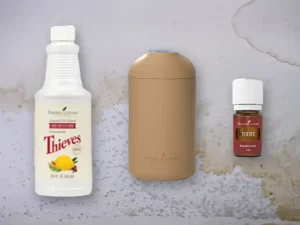While a lot of people in the essential oil world will say no, this isn’t actually correct. For years I had heard that you couldn’t be because essential oils don’t contain proteins. Apparently you can only be allergic to things that have proteins in them. While the first part of that statement is true, the second part is not. I’m going to talk you through why.
I, myself have never had an allergic reaction or any reaction actually to essential oils. Reactions are rare and to a certain degree these can be avoided with common sense practices. Practices such as dilution and using 100% pure essential oils from reputable companies. For the few people who do have a reaction, it is not helpful when they hear things like “You can’t be allergic to essential oils” or “You are probably just detoxing”. A reaction is still a reaction. It can be painful, itch like crazy and cause the person quite a deal of anguish.
What causes an allergic reaction?
Antigens enter the body and our body thinks these are dangerous. Our immune system thinks it is under attack and goes in to fight mode. Our body releases Immunoglobulin E antibodies (IgE) which then bind to the antigen in an effort to subdue it. These antibodies are usually coating mast cells or basophils (type of white blood cell) so the allergen becomes connected to this cells. These cells releases inflammatory chemicals such as histamine.
In most cases allergens are proteins or polysaccharids such as pollen, nuts, grass, insect stings etc. This is where the confusion comes in with regards to essential oils. Essential oils don’t contain proteins. The heavier molecules including proteins are left behind in the plant material when essential oils are distilled. They are just too heavy for the steam to carry them.
So how then can someone be allergic to essential oils?
This is what is called a Hapten response. The essential oil molecules are too small themselves and don’t contain any proteins to cause an allergic response themselves. When these molecules come in contact with proteins in the skin they can cause a reaction. Usually the first exposure may cause only mild skin sensitisation. The bodies immune system starts preparing for further attacks by building up antibodies should the body be attacked again. Then the next time that particular essential oil is used the symptoms of the allergic reaction may be a lot more severe.
When I studied aromatherapy one of my teachers had this happen with Tea Tree. She had previously used Tea Tree essential oil without any problems. However one day she just started to react. He hands became really itchy and they puffed up. She was using good quality essential oils. Over time her body had developed Haptens and these went in to overdrive every time she used Tea Tree essential oil.

Who is more likely to have a reaction or be allergic to essential oils?
People who’s bodies are already overloaded are more likely to have a reaction to essential oils. For example people with:
- sensitive skin;
- other allergies;
- high levels of stress;
- a recent vaccination;
- a recent illness;
- a history of using a lot of medications;
- a history of using personal care products that contain petrochemicals as essential oils interact with these if they are stored in the fat cells under the skin;
- acidic bodies or who eat a lot of acidic foods.
People can have also have reactions to:
- Hot oils which may feel like they are burning the skin when applied neat and even diluted such as oregano, lemongrass, thyme, cinnamon, peppermint etc – so it is best to dilute these essential oils, patch test a small amount or avoid altogether.
- Blends that contain nut oils such as almond oil or coconut oil – so always check the ingredient list.
- Citrus oils – these are photosensitive. See my article on photosensitivity for more info on this.
- Personal care products that contain certain ingredients such as bicarb today – so always check the ingredient list.
- Essential oil supplements which may contain dairy, shellfish, gluten etc – so always check the ingredient list.
What do I do if someone has a reaction or is allergic to essential oils?
- Stop using the essential oil or product. If the essential oils have been applied to the skin topically then try diluting it on the skin further by applying a carrier oil. Water does not wash essential oils off. If the reaction is severe then the person should seek medical help.
- Drink lots of water and look to alkalise the body.
- Switch to diffusing essential oils in the future instead of applying them topically. Scent is the fastest way to get essential oils in to the body anyway. If the person still has a reaction when essential oils are diffused then you may need to choose a different essential oil. Something more mild like lemon. Or stop using them altogether.
- Manage stress. Stress causes chemicals to be produced in the body which essential oils interact with so managing stress is not only good for your health it helps your essential oils work better.
- Dilute your essential oils more. Carrier oils are called carrier oils because they carry essential oils in to the body. Our skin is fat soluble which means it actually is permeated better by fats. So add your essential oils in to a fat or an oil when you apply them.
- Use only 100% pure essential oils from a reputable company. I only use and recommend Young Living essential oils as I have personally visited many of their farms, see their farming practices and their distillation. I know that every bottle I buy from them comes with the highest guarantee of quality. If people message me about reactions to essential oils, one of my first questions is usually which brand are you using? Many companies adulterate their essential oils with carrier oils or petrochemicals to extend them and their own profits along the way. More people have reactions to poor quality essential oils than good quality ones.
Use common sense
Essential oils may be natural but they are extremely potent so a small amount is all that is needed.
I often get messages from someone who has had a reaction and they ask what essential oils can I use to stop the reaction especially the itchiness? None. I don’t recommend further risk of inflaming the area by adding anymore essential oils. As mentioned above use a carrier oil such as coconut oil (if the person isn’t allergic to it) to further dilute any essential oil which may remain on the skin.
Get help or advice from a trained aromatherapist .










 Subscribe to Hot Oily Mumma
Subscribe to Hot Oily Mumma